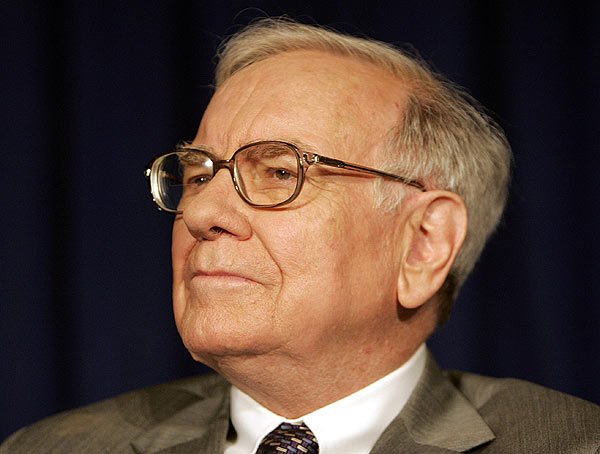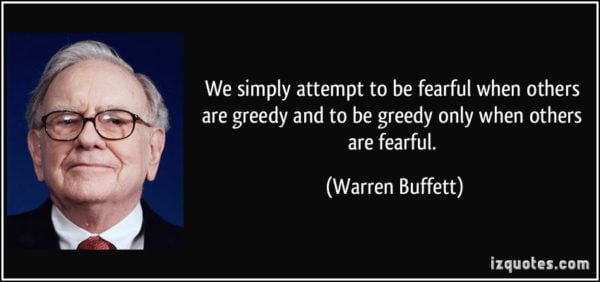One of the more famous—and certainly eerily relevant—quotes about financial self-awareness is from Warren Buffett, the “Oracle of Omaha”. The quote generally is rendered as:
“Be greedy when others are fearful and fearful when others are greedy.”

It’s a great slogan, and while it can be a little bit of a Epimenides-esque knot to untangle for oneself, I try to employ it as often as I have the presence of mind to do so.
But it occurred to me that I never once looked into the backstory behind the phrase. Where did it come from? What was its context? Does it hold greater lessons for all of us?
Table of Contents
Back in 2004
The first reference I can find to the phrase comes in one of Buffett’s annual letters to shareholders at Berkshire Hathaway. If you haven’t read these missives, you really ought to do so. They are conversational, witty, and usually quite interesting. It gives you some insight on the state of the economy from someone who has won it hands-down.
In the 2004 letter to shareholders, it starts out with some raw numbers and some basic analysis before quickly changing gears and getting personal.
In fact, mentioning how Berkshire Hathaway lagged the returns of the S&P 500 by 0.4% (!) he actually all but apologized for this:
“My hope was to make several multi-billion dollar acquisitions that would add new and significant streams of earnings to the many we already have. But I struck out.”
I’ll point out that shares rose by 10.5% that year. Hardly something to complain about.
The returns were there
In fact, he goes on to talk about just how successful things have been for stock market returns, but that the ride has been wild:
“If you examine the 35 years since the 1960s ended, you will find that an investor’s return, including dividends, from owning the S&P has averaged 11.2% annually (well above what we expect future returns to be). But if you look for years with returns anywhere close to that 11.2% – say, between 8% and 14% – you will find only one before 2004.”
This is a little tough to unpack, but what he is saying here is that while returns averaged 11.2%, from year to year you found a huge swing in returns. For example, from 1999-2003, the returns were: 21.0%, -9.1%, -11.9%, -22.1%, and 28.7%. That’s some serious swing.
But so what? The problem, as he goes on to say, is that people didn’t just hold tight and ride out the waves:
“All they had to do was piggyback Corporate America in a diversified, low-expense way. An index fund that they never touched would have done the job. Instead many investors have had experiences ranging from mediocre to disastrous.”
This is a theme that he comes back to from time to time. Perhaps as famously, in the report from 2013, Buffett suggested that most people would do well to just invest in index funds from Vanguard and call it good. That’s what he’d recommend for his own wife after his passing.
Why people lost out
Indeed, he cites three reasons why investors lost so much while the indexes gained. Paraphrasing, losses were due to:
- Paying too high costs for management and trading
- Decisions made based on fads/trends instead of fundamentals
- Timing the market
You could just stop there. Pin those three bullets to any place where you might be wanting to make financial decisions.
But of course, Buffett hammered that final point home is his own inimitable style:
“Investors should remember that excitement and expenses are their enemies. And if they insist on trying to time their participation in equities, they should try to be fearful when others are greedy and greedy only when others are fearful.”
And there we have the quote.
Lost clause
All of these quotes are gems to me, but I find most interesting is the opening clause: “If [investors] insist on trying to time their participation in equities…”
That part is lost in the quoting, and it was lost to me until I researched for this post.
So the greedy vs. fearful determination was really only aimed at those trying to time the market. And remember, only a few lines above it, that was something that Buffett was specifically trying to discourage most investors from doing.
So what if you’re not trying to time the market?
If not, fear and greed mostly don’t matter.
You see, if you follow an investment plan, like one that includes dollar-cost averaging (a set amount of investment each month) and index funds (which broadly track the wider market), and are focused on the long term, then fear and greed might be present, but are mostly irrelevant.
And it’s easy to see where fear and greed can get you. Buffett told us way back in 2004.
Are we listening? This time is no different.

Have you gleaned any other wisdom from Warren Buffett? I’d love to hear about it in the comments below.


